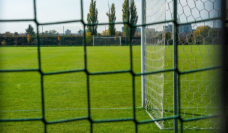Athletes are modern-day gods. People flock to stadiums to worship their teams, and tithe for tickets to feel nearer to divinity. Fans perform idolatry by poster and retell the origin and legend of their sports heroes. Athletes achieve seemingly immortal accomplishments, but we still view mental distress as their mortal flaw, a fated weakness – an Achilles Heel.
During the 2021 Summer Olympics, renowned gymnast Simone Biles left competition due to a condition known as the “twisties,” which she described as being “literally … [unable] to tell up from down.” A couple months prior, tennis champion Naomi Osaka withdrew from Wimbledon and the French Open, acknowledging her recurring episodes of depression. In 2019 swimmer Michael Phelps tweeted “I struggled with anxiety and depression and questioned whether or not I wanted to be alive anymore.” Two weeks ago, NBA player Ben Simmons told his team, the Philadelphia 76ers, that he wasn’t mentally ready to play and needed to step away from the court. Many elite athletes experience depression, anxiety, and other psychological disorders, yet admitting to a mental illness exposes them to fierce stigma and discrimination. Though these famous athletes made their mental health struggles known, they are but a few voices amidst the silence of many.
As a former Division I athlete, I understand how athletes are asked to push themselves to mental and physical limits, blurring the line between “too far” and “not far enough.” Coaches often cite an athlete’s “weakness” if they don’t perform up to certain expectations, a practice that has led to many elite athletes believing that they should play through pain without complaint. These pressures can produce or exacerbate mental distress, and can cause athletes to avoid seeking professional help.
Mental health screening in elite sports is new and limited. Most college athletic programs do not have a full-time mental health professional on staff. In addition to staffing athletic programs and supporting athletes when they choose to speak publicly about their mental health issues, we need to change sports culture by redefining what success means in sports.
Success for athletes is currently defined as 1) winning, and 2) playing time. Sports culture also preaches the expectation of an exact meritocracy – if you work hard, then you will be “successful”. But someone has to lose, and not everyone plays. When we reinforce this expectation of success, athletes can view shortcomings as abject failures rather than learning moments.
Instead, athletes need to think about being “better” rather than “best.” “Better” encourages intentional, sustained practice. “Best” simply suggests dominance over an opponent. Teaching “better”-ment inspires athletes to focus on improving for the next chance they get to compete, whether they won or lost the last time. This new definition of success encourages athletes to be fierce competitors while valuing lifelong learning just as much, if not more than winning and playing time.
This new culture will start with coaches. Coaches hold substantial influence in determining an athlete’s self-worth and view of the game, with minimal oversight. If coaches nurture this new definition of success and form meaningful relationships with their athletes, athletes are more likely to feel able to manage the demands of competition and seek help if it’s needed. Coaches need to make clear to athletes that they can come to them for support, and that they will approach their athletes if they believe their players’ mental health is at risk.
Society has reduced sports to the dichotomy of winners and losers. We want our athletes to excel, and to become more excellent over time, but not at extraordinary risk to their health. Many athletes have dedicated a large part of their lives to sports, which augments the emotional response to failure when sports have become an integral part of their identity. If we change how we view success in sports, society may start to see athletes as people. A shift in sports culture can teach both athletes and fans to value more than individual accomplishment. Isn’t that why we watch sports in the first place? To feel part of something greater than ourselves?
For ages, people have called upon the gods for help, but have we ever thought that our gods need help too? We must allow our gods to be human.
Photo via Getty Images














